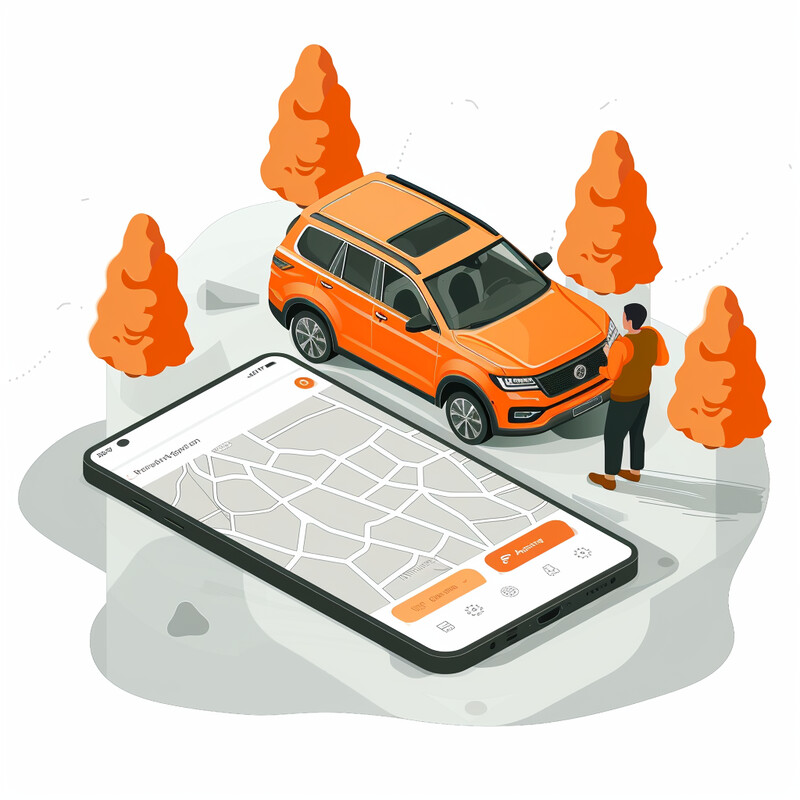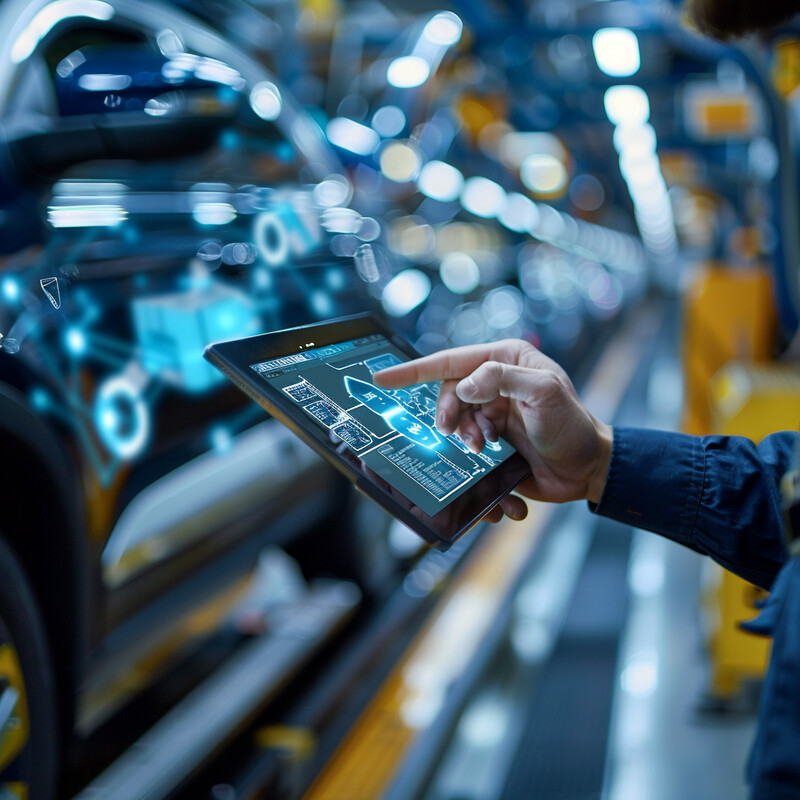1. Dynamic Pricing Models
AI-driven dynamic pricing is transforming how car rental companies set their rates in real time. Machine learning algorithms analyze factors like demand, seasonality, local events, and competitor prices to adjust rental rates on the fly. This allows companies to maximize revenue per vehicle while still remaining competitive in the market. By continuously learning from booking patterns and market data, AI pricing models can respond faster and more precisely than manual pricing teams. The result is often better fleet utilization (fewer cars sitting idle) and increased profitability, as prices can be raised during peak demand and lowered to stimulate demand during lulls. Crucially, these systems maintain pricing flexibility without constant human intervention, though companies must balance automation with transparency to keep customer satisfaction high.

In practice, AI-based dynamic pricing has yielded significant revenue gains for car rental firms. For example, a Dubai rental company implemented an AI pricing engine and reported up to a 46% increase in revenue per car within weeks of deployment. Such systems are increasingly common – U.S. rental fleets extensively use dynamic pricing post-pandemic to manage supply and demand. Industry analyses note that 2024 average rental rates remained ~35% higher than pre-pandemic levels, partly due to yield-optimizing algorithms. These real-world results underscore how AI pricing models can boost income by continuously optimizing rates in response to market conditions, something that was much harder to achieve with static pricing strategies.
2. Customer Verification and Fraud Detection
AI is enhancing security in car rentals through more robust customer verification and fraud detection. Modern rental platforms use AI to automate identity checks – for instance, computer vision can match a driver’s license photo to a selfie, and cross-verify details against databases in seconds. Machine learning models also analyze user behavior and transaction patterns to flag anomalies (like multiple bookings with the same credit card or location irregularities) that might indicate fraud. This proactive monitoring helps catch identity theft, payment fraud, or even attempts to steal vehicles under false identities. By leveraging vast historical data on fraudulent behaviors, AI systems continuously improve their accuracy in discerning legitimate customers from bad actors. Overall, AI-driven verification not only speeds up the check-in process for honest customers but significantly reduces the risk of financial loss and vehicle theft for rental companies by intercepting fraud before it happens.

Leading car rental companies have started deploying AI-powered fraud prevention platforms to protect their operations and customers. Hertz, for example, partnered with an AI fraud detection firm in 2023 and gained new tools to minimize theft and fraudulent transactions. The system uses machine learning to safeguard payment data and loyalty accounts from takeover, and it analyzes booking behavior to weed out suspicious activity. In its first year, Hertz reported improved efficiency in spotting and stopping fraud while maintaining a seamless experience for legitimate customers. This mirrors a broader trend in the industry: by integrating AI-driven fraud platforms, rental companies can reduce fraudulent incidents and associated losses, reinforcing trust and security in their services.
3. Personalized Rental Recommendations
AI enables a higher degree of personalization in car rentals, tailoring the experience to each customer’s needs. By analyzing customer data – past rental history, vehicle preferences, travel purpose, and even real-time context – AI recommendation engines can suggest the most suitable vehicle or add-on services for each renter. For instance, a frequent business traveler might automatically be offered a premium sedan and a Wi-Fi hotspot, while a family vacationer might see an SUV with a child seat recommended. This level of personalization improves customer satisfaction because renters feel the company understands their preferences and needs. It also tends to increase ancillary revenue and loyalty, as customers are more likely to book additional services or stick with a brand that “gets” them. AI makes these recommendations possible at scale, constantly learning from feedback (which cars were chosen or ignored) to refine suggestions for future users. Ultimately, it turns what used to be a generic rental process into a more customized and convenient experience for each customer.

Personalization has a measurable impact on customer behavior in the travel and rental industry. A recent 2023 survey by Skift found that 79% of travelers say personalized experiences significantly influence their booking decisions, indicating how strongly consumers respond to tailored suggestions. In practice, car rental companies using AI recommendation systems have seen higher conversion rates on upgrades and add-ons, as the AI can present options that align closely with a customer’s past preferences. More broadly, management consulting research notes that companies excelling at personalization generate substantially more revenue – McKinsey reported that data-driven personalization can boost revenue by 40% in travel and hospitality sectors. These data points underscore that AI-powered personalization isn’t just a nicety; it tangibly improves customer engagement and loyalty, leading to higher retention and sales. (Skift, 2023)
4. Automated Fleet Management
AI is improving the efficiency of fleet management for car rental companies by automating and optimizing many aspects of vehicle oversight. Through telematics and IoT sensors installed in rental cars, AI systems can monitor vehicle location, usage patterns, fuel levels, and maintenance status in real time across an entire fleet. This wealth of data allows algorithms to make smart decisions, such as redistributing vehicles to locations where demand is rising or flagging underutilized cars for relocation. AI also helps in “right-sizing” the fleet – identifying how many cars of each type are needed at each branch to meet predicted demand, thus reducing excess inventory. Moreover, by analyzing driver behavior and fuel consumption, AI can suggest ways to optimize routes or reduce idling, saving on fuel costs. All these improvements mean operations managers can respond faster to changing conditions (like an unexpected surge in weekend rentals or a drop in demand in one city) with minimal manual intervention. The net effect is lower operational costs and higher availability of cars when and where customers need them, thanks to AI’s continuous, data-driven fleet coordination.

The efficiency gains from AI-driven fleet management can be substantial. Industry analysts estimate that integrating AI into fleet operations can cut operating costs by around 20% through smarter utilization and reduced downtime. For example, AI optimization can decrease the time vehicles sit idle by reallocating them dynamically – one fleet management platform reported boosting utilization rates by ~15%, translating to millions in additional revenue for large rental fleets. Predictive analytics also lower costs by trimming fuel waste and preventing maintenance issues (e.g., avoiding breakdowns saves expensive repair and towing fees). A U.S. analysis by Frost & Sullivan noted that AI-based fleet solutions help companies save on fuel and maintenance, contributing to these double-digit percentage cost reductions. Such figures highlight why car rental fleets, some numbering in the hundreds of thousands of vehicles, are turning to AI: it drives measurable improvements in efficiency, cost savings, and ultimately profitability.
5. Self-Service Options
AI is powering self-service rental options that make renting a car faster and more convenient. Many car rental companies now offer AI-enabled kiosks or mobile apps that let customers verify their identity, choose a car, and complete the rental agreement without needing a human agent. These systems use technologies like facial recognition or document scanning to validate driver credentials, and they integrate with backend systems to dispense keys (or activate digital keys) once verification and payment are confirmed. By automating the check-out and return processes, AI-driven self-service drastically cuts down wait times – customers can skip the counter lines and be on the road in minutes. This not only improves the customer experience (especially for travelers arriving from long flights who appreciate the speed) but also reduces staffing needs for the company. Locations can operate efficiently even during late-night hours with minimal personnel, since the kiosk or app can handle transactions and answer routine questions via an embedded chatbot. Overall, AI-powered self-service is redefining rental convenience, allowing 24/7 rentals and quick, contactless interactions that align with modern consumer expectations for on-demand service.

The impact of self-service technology on customer satisfaction and efficiency is backed by data. Surveys indicate that about 75% of rental customers prefer using self-service kiosks due to their speed and ease of use, and locations that have deployed these kiosks report markedly shorter wait times. In fact, automated rental kiosks have been shown to reduce average customer wait times by roughly 50%, as the AI system can process ID checks and paperwork far faster than a manual agent. This has led to higher customer satisfaction scores for those locations, as travelers spend less time in line and more time on the road. The convenience factor also translates to increased usage: one industry report noted a 40% growth in urban rentals through kiosks over five years as more customers gravitated to the quick self-service model. These figures demonstrate that AI-powered self-service isn’t just a novelty – it tangibly improves the rental process efficiency and is increasingly demanded by consumers.
6. Predictive Maintenance
AI allows car rental companies to perform predictive maintenance on their fleets, meaning vehicles are serviced right before an issue is likely to occur rather than after a breakdown. By analyzing data from onboard sensors (engine diagnostics, oil levels, tire pressure, brake wear, etc.) and historical maintenance records, machine learning models can detect patterns that precede mechanical problems. For example, an AI system might learn that a subtle vibration pattern in the transmission data predicts a failure with 1,000 miles notice, prompting the system to flag that car for repair soon. This approach prevents costly roadside breakdowns and towing situations, as vehicles get repaired during scheduled downtime instead of unexpectedly stranding a customer. Predictive maintenance also optimizes service intervals – cars aren’t brought in too early (wasting useful part life) or too late (after damage is done), but at the “just right” time. Over a large fleet, this minimizes total downtime, keeping more cars available for rent, and extends vehicle lifespans by avoiding severe damage. In short, AI shifts maintenance from a reactive or fixed-schedule task to a smart, proactive strategy, improving safety and saving money.

Predictive maintenance driven by AI has proven to significantly reduce both maintenance costs and unplanned downtime. According to research by McKinsey, using AI analytics for vehicle maintenance can lower maintenance expenses by up to 30% and cut breakdown-related downtime by almost 50%. In the rental car context, this means substantial savings on repair bills – catching a problem early often turns a $500 fix into a simple $50 part replacement – and far fewer days that cars spend out of service. One fleet study in 2024 similarly found that companies using predictive maintenance algorithms reduced unscheduled vehicle downtime by 12% compared to those on routine schedules. These gains translate into more rental availability and revenue. For example, if a car is kept on the road rather than in the shop an extra few days per month across a fleet of thousands, the additional rental income is significant. The data overwhelmingly shows that AI-based predictive maintenance improves reliability and efficiency, which is why it’s being rapidly adopted in large fleet operations.
7. Chatbots for Customer Service
AI chatbots are becoming a frontline customer service tool in car rentals, providing instant support around the clock. These chatbots, often accessible via the rental company’s website or mobile app, can handle a wide range of inquiries – from simple questions about rental policies, extension requests, and roadside assistance, to helping customers make new reservations or modify existing ones. Using natural language processing, the AI understands customer messages (or voice calls) and responds with relevant, pre-trained answers or actions. This reduces wait times dramatically, as customers no longer need to call a support line and navigate hold queues for common issues. For the rental companies, AI chatbots free up human agents to focus on more complex or high-value tasks while the routine queries (which often constitute the majority of contacts) are resolved automatically. Additionally, these bots continuously learn from interactions, so their accuracy and helpfulness improve over time. By being available 24/7, AI-driven customer service ensures that even outside of office hours or during peak travel seasons, customers receive prompt assistance, thereby improving overall service experience and potentially boosting the company’s reputation and loyalty.

The efficiency and cost benefits of AI chatbots in customer service are well documented across industries. In the car rental sector, their impact is similar – studies show that AI chatbots can handle up to 80% of routine customer inquiries, which can reduce customer service costs by about 30% for companies deploying them. For instance, questions about billing, extending a rental, or location hours are often answered instantly by the bot, saving customers from a phone call. This automation has translated into tangible savings: businesses using AI virtual agents in travel services have cut staffing needs during peak times by over 50% while maintaining service quality. According to Gartner projections, by 2025, AI-driven conversational systems will save companies billions in support costs by automating interactions that previously required live agents. Moreover, customer surveys indicate a growing acceptance of chatbots – a majority of consumers are willing to use a bot if it means getting immediate answers instead of waiting for a human. In sum, AI chatbots significantly streamline customer support operations in car rentals, driving down costs and response times simultaneously.
8. Route and Traffic Management
AI assists car renters in navigating efficiently by providing advanced route and traffic management features. Rental companies are beginning to integrate AI-powered navigation systems in their vehicles or apps, which go beyond a standard GPS. These systems analyze real-time traffic data, road conditions, and even predictive models (like upcoming congestion based on time of day or events) to suggest optimal routes for renters. For the customer, this means a smoother driving experience – less time stuck in traffic and more accurate estimates of arrival times. In some cases, rental agencies with delivery and pickup services also use AI to plan the routes of their staff or contractors when shuttling cars between locations or to a customer’s doorstep, ensuring timely deliveries. Additionally, AI can tailor route suggestions to user preferences (for example, a scenic route vs. the fastest route if the customer is on vacation and indicates interest in sightseeing). By leveraging vast amounts of traffic data and machine learning, these systems dynamically reroute drivers around accidents or bottlenecks in real time. This not only improves customer satisfaction (nobody enjoys unexpected traffic jams) but can also save fuel and reduce wear on vehicles by avoiding stop-and-go traffic. Essentially, AI brings the kind of smart routing that ride-hailing services use to the car rental customer, enhancing the driving phase of the rental experience.

Real-world data shows significant benefits from AI-optimized routing. A 2024 industry analysis highlighted that companies using AI for route optimization achieved up to a 20% reduction in operational costs, largely thanks to shorter travel times and fuel savings. For instance, by guiding drivers to avoid congested areas, an AI navigation system can cut a trip’s duration by a considerable margin – some studies in urban settings found time savings on the order of 10–15% for AI-rerouted journeys compared to static GPS directions. In one case, UPS’s logistics (though not a rental car company, it illustrates the point) famously saved millions of gallons of fuel by using route algorithms that eliminated unnecessary miles – similarly, a rental fleet that optimizes routes for vehicle relocations or airport shuttle vans can greatly reduce fuel consumption. Moreover, customer-facing navigation apps with live AI traffic updates lead to higher satisfaction scores, as renters reach their destinations more reliably on schedule. The growth of connected car data in rentals means these efficiency gains will only increase, with fewer instances of customers getting lost or delayed. The evidence is clear that AI-driven route management yields faster, more cost-effective travel.
9. Accident and Damage Analysis
AI is streamlining accident and damage analysis in car rentals by automating the inspection and claims process. Traditionally, when a rental car is returned, an employee must visually inspect it for new dents, scratches, or other damage – a process that can be error-prone or inconsistent. Now, AI-powered inspection systems use high-resolution cameras and computer vision to detect even minor damage on a vehicle’s body, glass, or tires. These systems can compare current images of the car against images taken at checkout (or against a digital twin model of the car’s pre-rental condition) to pinpoint new damage with high accuracy. In the event of an accident during the rental, telematics data and AI can reconstruct aspects of the incident (such as speed or braking before a collision) to assist in liability assessment. The benefits are twofold: customers are treated more fairly and transparently – they can be shown objective evidence of any damage and are less likely to be erroneously charged for pre-existing issues – and rental companies can process damage claims faster, sometimes instantly generating repair estimates using AI. This technology reduces disputes and argument at the counter, speeds up the return process for both parties, and helps maintain the fleet in better condition by ensuring damages are caught and fixed promptly.

Major rental companies have begun rolling out AI-driven vehicle inspection stations to improve damage detection efficiency. Hertz announced in 2024–2025 that it is installing over 100 AI-powered “car scanner” portals at airports, which can examine a returned vehicle in seconds and spot scratches, dents, or tire issues that a human might miss. These systems, developed by tech firms like UVeye and Ravin AI, use 360-degree cameras and machine learning to compare the car’s condition before and after rental. The result is a much faster check-in: the AI can perform a full inspection in a fraction of the time of a manual walk-around, often reducing inspection time from several minutes to just seconds. Hertz reported that this initiative is expected to enhance inspection accuracy and consistency across all locations, reducing cases of damage going unnoticed or uncharged. Early implementations also show improved customer clarity – renters receive a digital report with photos of any damage detected, making the process more transparent. This move by Hertz and interest from other big rental players underscore how AI is modernizing damage assessment, cutting operational costs and dispute incidents in the process.
10. Enhanced Loyalty Programs
AI is elevating car rental loyalty programs by making rewards and offers more personalized and relevant to each customer. Traditionally, loyalty programs might offer the same perks (like free days or upgrades after a certain number of rentals) to everyone. With AI, rental companies can analyze a member’s rental history, travel frequency, preferences, and even external data (like airline status or hotel preferences) to tailor rewards that matter most to that individual. For instance, an AI system might determine that a particular customer values convenience over price, and proactively offer them free delivery of the rental car or a guaranteed model upgrade as a loyalty perk. Another customer who rents mostly for family vacations might receive complimentary GPS or child seats as a reward. AI can also predict when a customer is at risk of churning – say, if their rentals have tapered off – and trigger a personalized incentive (such as a special discount for their next trip to a favorite destination) to re-engage them. Moreover, by analyzing overall program data, AI helps optimize the loyalty tiers and reward structure to ensure they drive desired behaviors (like more frequent rentals or higher ancillary purchases) while controlling costs. Overall, AI makes loyalty programs smarter: more dynamic in adjusting to customer needs and more effective in fostering genuine loyalty through individualized recognition.

Data shows that applying AI and predictive analytics to customer engagement can significantly boost loyalty metrics. According to a 2024 McKinsey report, companies using AI-driven predictive analytics saw about a 15% increase in customer retention as a result of enhanced user experiences. In the context of car rentals, this can translate to more repeat bookings and higher program enrollment. For example, if a rental firm’s AI identifies that a customer often rents in winter for ski trips, it might offer an AWD vehicle upgrade and a ski rack as a loyalty perk – a personalized touch that increases that customer’s likelihood to stick with the company. Early adopters of AI in loyalty programs (including some airlines and hotels, which have analogous models to car rentals) have reported higher active participation rates and greater spend per member due to tailored promotions. Additionally, AI helps identify what rewards truly drive retention versus those that don’t, allowing rental companies to invest in benefits that yield ROI in loyalty. The 15% retention lift cited by McKinsey underscores the tangible impact: in a competitive market, keeping an extra 15% of customers loyal through AI-personalized engagement is a significant advantage for rental companies.